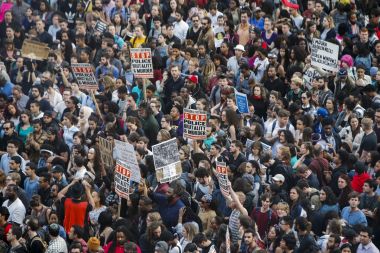First black Southern Baptist president says US race relations worse under Obama
Race relations in America have worsened under President Obama's leadership, a former head of the Southern Baptist Convention (SBC) has claimed.
Fred Luter, the first African-American president of the SBC, said that he had hoped Obama's 2008 election was a sign that the US was "ready to move forward from our days of segregation" and would provide an "opportunity for our nation to come together and make us one as a nation".

"But unfortunately you know and I know that is not the case," Luter said in a video released last week for Black History Month. "I think it's gotten even worse as a result of what we've seen in recent years in America."
Race relations have proved a significant issue in the US over the past few years, particularly in the wake of the 2014 riots in Ferguson, the shooting at a church in Charleston by a white supremacist and the rise of the Black Lives Matter movement. Racism within the US police force has been raised as a particular concern; a damning report into Ferguson found that racial discrimination against black minorities was prevalent among the area's police officers.
This has made it a key issue in the run up to the 2016 presidential election, with a number of candidates promising to improve relationships between communities.
On the 60th anniversary of Rosa Parks' refusal to stand up on a Montgomery bus for a white passenger – an act of civil disobedience that sparked the US civil rights movement and eventually led to the end of legalised racial segregation in America – democratic candidate Hillary Clinton gave a rousing address at the historic church once pastored by Martin Luther King Jr.
"There is something profoundly wrong when African American men are far more likely to be stopped and searched by police, charged with crimes, and sentenced to longer prison terms for doing the same thing as a white man," she said.
"We must strengthen the bonds of trust between law enforcement and the communities they serve."
Clinton added: "Even as we celebrate all that our country has achieved in the past 60 years, we must in keeping with the legacy of those who have gone before look to the future and the work that is left to do.
"Our work isn't finished. We do have to pay it forward. There are still injustices perpetrated every day across our country, sometimes in spite of the law, and sometimes, unfortunately, in keeping with it."
Luter, whose term as SBC president ended in June 2014, said the Convention – which was founded over a split over whether slave owners could serve as missionaries – had repented for its past role in segregation.
"Listen, all of us have a past. I've got a past. You've got a past. Every last one of us has a past," he said.
"We regret the past of this convention. This convention has publicly apologised for our past at several conventions that I've been a part of. We've made it known through resolutions that we want this convention to be more diverse, and it is."
He said that now, the SBC is "the most diverse convention of any convention in America".
"When it comes to Anglos, Hispanics, Asians, African-Americans, there is no other convention that comes close to our diversity in the Southern Baptist Convention, but we've got to get to the point, hopefully, that one day that will not be an issue.
"The issue needs to be: What are we doing in evangelism? What are we doing in discipleship? What are we doing in reaching the lost and changing this world? That's what I pray will happen. We're not there yet."
He also expressed a hope for the future of race relations in America.
"We can be one," Luter said. "Regardless of your race, regardless of what side of the track you were born on, regardless of all the things the media and society have tried to do to divide us, we can be one."











